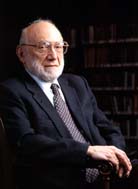 Joshua Lederberg (May 23, 1925 – February 2, 2008) was an American molecular biologist known for his work in genetics, artificial intelligence, and space exploration. He was just 33 years old when he won the 1958 Nobel Prize in Physiology or Medicine for discovering that bacteria can mate and exchange genes.
Joshua Lederberg (May 23, 1925 – February 2, 2008) was an American molecular biologist known for his work in genetics, artificial intelligence, and space exploration. He was just 33 years old when he won the 1958 Nobel Prize in Physiology or Medicine for discovering that bacteria can mate and exchange genes.
In addition to his contributions to biology, Lederberg did extensive research in artificial intelligence. This included work in the NASA experimental programs seeking life on Mars and the chemistry expert system Dendral.
In 1958, Joshua Lederberg received the Nobel Prize and moved to Stanford University where he was the founder and chairman of the Department of Genetics. He collaborated with Frank Macfarlane Burnet to study viral antibodies.
With the launching of Sputnik in 1957, Lederberg became concerned about the biological impact of space exploration. In a letter to the National Academies of Sciences, he outlined his concerns that extraterrestrial microbes might gain entry to Earth onboard spacecraft, causing catastrophic diseases. He also argued that microbial contamination of manmade satellites and probes may obscure the search for extraterrestrial life. Teaming up with Carl Sagan, his public advocacy for what he termed exobiology helped expand the role of biology in NASA. In the 1960s, he collaborated with Edward Feigenbaum in Stanford's computer science department to develop DENDRAL.
In 1978, he became the president of Rockefeller University, until he stepped down in 1990 and became professor-emeritus of molecular genetics and informatics. Throughout his career, Lederberg was active as a scientific advisor to the U.S. government. Starting in 1950, he has been a member of various panels of the Presidential Science Advisory Committee. In 1979, he became a member of the U.S. Defense Science Board and the chairman of President Jimmy Carter's President's Cancer Panel. In 1989, he received National Medal of Science for his contributions to the scientific world. In 1994, he headed the Department of Defense's Task Force on Persian Gulf War Health Effects, which investigated Gulf War Syndrome.
In 2006, Lederberg was awarded the Presidential Medal of Freedom.